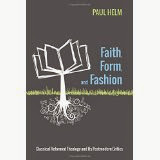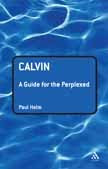One of the matters stressed in the writings of Paul Helseth and David P. Smith on Princeton theology, and especially (in Smith’s case) on Warfield is the Princetonians conviction that sin affects not only the affections and the will, but the understanding as well. (Paul Kjoss Helseth, “Right Reason” and the Princeton Mind (P & R 2010); David P Smith, B.B. Warfield’s Scientifically Constructive Theological Scholarship, (Pickwick, 2011)) These days this is referred to as the noetic effects of sin, but used to be called total depravity, a deformation affecting all aspects of the mind. Appreciating this (in the case of Warfield) moves him decisively out of the world of rationalism, and closer to the outlook of the Dutch Calvinists who were his contemporaries, Abraham Kuyper and Herman Bavinck, with whom he had cordial relations and whom he highly regarded. He refers to Kuyper as a ‘thinker of quality’ who has exercised a ‘remarkable influence’ in Holland. And about Bavinck he says that he ‘brilliantly represents’ the neo-Calvinist outlook.
Yet despite their accord over the noetic effects of sin on the mind, (hereafter NS) Warfield and the Dutch were somewhat at odds in the area of apologetics, and perhaps our renewed appreciation of their agreement on NS makes this harder to understand than if Warfield had believed that reason was unaffected by sin, or less affected, as Van Til thought that he did, and how dozens of our contemporaries do, who believe that the entire tribe of the Princetonians were significantly influenced by what they call ‘Enlightenment rationalism’.
In this short piece I shall touch on factors that in Warfield’s case seem to account for the continued differences between them, but without referring to his encyclopaedia article on Apologetics. This is, perhaps, a mistake, but to be frank I find this production of Warfield’s nearly incomprehensible, and something of an opportunity missed, and I gladly leave to others the task of taking up Ariadne’s thread and telling us what the great man is saying there. So we shall look principally at Warfield’s Introduction to Francis Beattie’s book on apologetics, and his review of Bavinck’s book on certainty, conveniently reprinted next to each other in the second book of his shorter writings.
Warfield readily recognises the fundamental point that reasoning with an unbeliever about the existence of God, or the state of his soul, will not ensure success, but that this is not a very telling thing to say, as the same can be said of any mode of communication between the parties. Whether it’s sowing or watering, only the Lord can give the increase. Why then does he continue to advocate reasoning with the unconverted?
One factor is that in reasoning we (naturally enough) recognize the importance of reason. And in recognizing the reason we recognize the importance of truth. (ref.) But other factors than this may hold the key to the differences, which seem not to have been noticed, and so I shall dwell on these a little.
Imagine the Kuyperian and Warfieldian approaches to Apologetics (as widely understood) as two limits of a continuum. Then I suggest that renewed awareness of Warfield’s commitment to NS narrows the the continuum, but in a way that moves Kuyperianism in the Warfieldian direction. Both hold to the noetic effects of sin, but Warfield agrees that any argument or strategy of communicating the gospel to sinners depends for its effectiveness on God giving the increase, and God alone can give it, something that Kuyper must surely recognise.
More, each holds to the differential effect of sin on the mind. In some areas its impact is greater than in others. Its impact is less in the case of formal disciplines, logic and mathematics and greater in those disciplines which involve estimates of value, such as history and literature and most of all, religion and those disciplines adjunct to it, theology in its different departments. And each recognizes that those who enjoy the effects of the palingenesis nonetheless live with the effects of unregeneracy until their dying day. Though enjoying God’s special grace, indwelling sin continues to affect reason, emotions and will. The children of light are still, in that sense, totally depraved.
Warfield reckons that the root difference between himself and the Dutch lies in a different understanding of the intensity of NS, and particularly of the effects of regeneration upon the mind. Kuyper held that there are two kinds of people, those who enjoy the regenerating enlightenment of God the Holy Spirit, and those who do not. And correspondingly there are two kinds of science, that conducted by the regenerate, and that conducted by those whose minds remain darkened. Warfield comments
There certainly do exist these “two kinds of men” in the world, - men under the unbroken sway of sin, and men who have been brought under the power of the palingenesis. And the product of the intellection of these ‘two kinds of men’ will certainly give us “two kinds of science”. But the difference between the two is, after all, not accurately described as a difference in kind – gradus non mutant speciem. Sin has not destroyed or altered in its essential nature any one of man’s faculties, although – since it corrupts homo totus – it has affected the operation of them all. The depraved man neither thinks, nor feels, nor wills as he ought; and the products of his action as a scientific thinker cannot possibly escape the influence of this everywhere operative destructive power, although, as Dr Kuyper lucidly points out, they are affected in different degrees in the several “sciences”, in accordance with the nature of their objects and the rank of the human faculties engaged in their structure. Nevertheless, there is question here of perfection of performance, rather than of kind. It is “science” that is produced by the subject held under sin, even though imperfect science – falling away from the ideal here, there, and elsewhere, on account of all sorts of deflecting influences entering in at all points of the process. The science of sinful man is thus a substantive part of the abstract science produced by the ideal subject, the general human consciousness, though a less valuable part than it would be without sin. (SSW II 100-1)
There may be a different way of putting this. Two people may each admire a ring but one of them does not know that the peculiar shade of the gold is due to the fact that the gold is Welsh gold. Each recognizes the ring for what it is, and they are capable of distinguishing it from a brooch and a sovereign. Or two may recognize it for what it is but neither know that the peculiar glow of the gold is due to its Welshness, even though one of them knows that the gold is Welsh. The novice and the expert are nevertheless capable of referring to the same object. The point can be put philosophically. Some Reformed critics of Warfield espouse a strong version of the doctrine of internal relations, according to which no one can truly be said know that this is a ring unless they understand all else that it is related to, and especially that it is created by God. In which case an atheist does not, appearances to the contrary, recognize that this is a ring, except where God’s common grace intervenes. Common grace ensures referential success, but not fullness of understanding which (in any case) no one possesses.
But even if the effects of regeneration were complete, and the children of light had every taint of sin removed in this life, Warfield doubts whether ‘the science produced by the two classes of men could be treated as absolute. Sinful and sinless men are, after all, both men; and being both men, are fundamentally alike’. Warfield might say that the differences between the two is a matter of perfection of performance, and not of kind. And this outlook seems to entail a denial of the strong doctrine of internal relations. There are different degrees of understanding the ring. Warfield’s understanding of our knowledge of things is more granular than some of the his critics; we can know that this is a ring but be in ignorance of much about it. Not every fact is an interpreted fact, and those that are may have different layers of interpretation, some of which may be separable from the others and may convey to the intelligent enquirer truth but not the whole truth. So I suggest that the differences in outlook on these questions may boil down to a philosophical difference. (Whether or not he gained this outlook from Scottish Common Realism I leave others to try to answer.)
However, despite these differences, the outlook of Warfield may be closer to that of neo-Calvinism than we have seen so far. He writes appreciatively of Kuyper’s and Bavinck’s work on common grace, and of Kuyper’s writings on social and political questions. We shall try to estimate the significance of these similarities next time.









